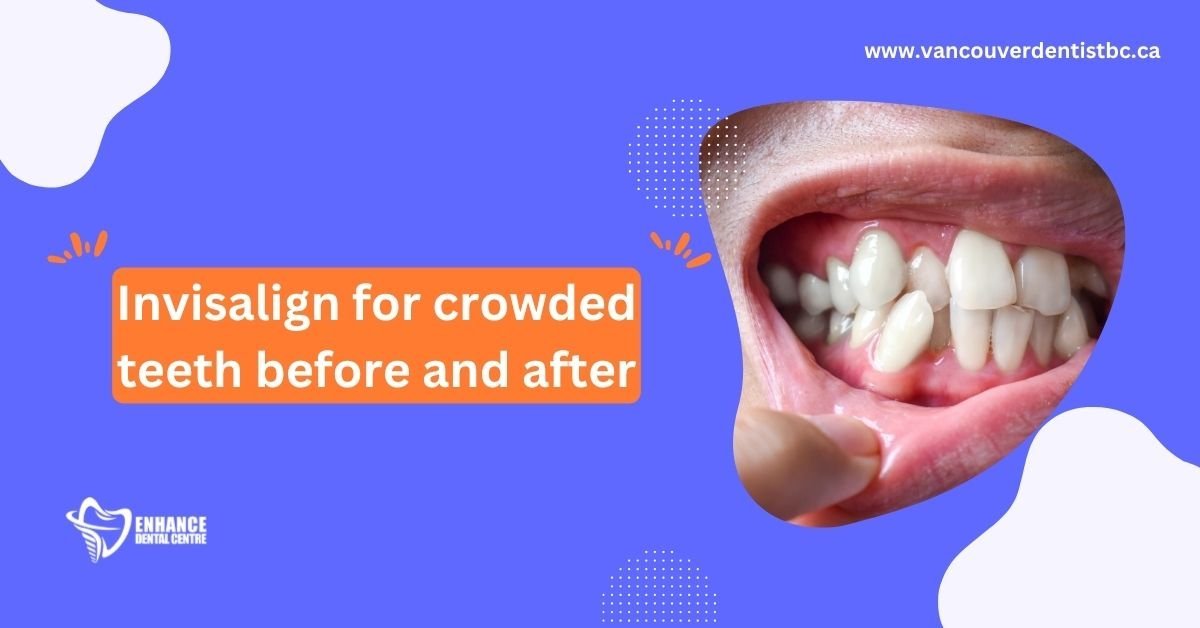A root canal is a common procedure to save a tooth damaged by decay, infection, or injury. The tooth’s pulp, containing nerves and blood vessels, can become inflamed or infected due to deep decay, repeated dental restorations due to injury , or a crack, causing pain and potentially leading to an abscess.
While the term “root canal” may sound intimidating, the procedure itself is straightforward and primarily focused on relieving pain while restoring the health of your tooth.
At Enhance Dental Centre, our experienced team ensures your treatment is as comfortable and seamless as possible. In this guide, we’ll outline what to expect before, during, and after a root canal treatment, helping you feel informed and confident throughout the process.
What to Expect Before Your Root Canal
Before starting root canal therapy, your dentist or endodontist will thoroughly evaluate your tooth. This often begins with X-rays to assess the affected area and confirm whether a root canal is necessary. Additional tests may follow, such as gently tapping on your tooth or applying hot or cold stimuli to check for sensitivity.
An electric pulp test (EPT) might also be used. This device sends a mild electric current through the tooth to determine if the pulp is inflamed, infected, or no longer viable. Dentists will also look for signs of swelling in your gums or the bone surrounding the tooth and may ask whether biting causes discomfort.
If the cavity causing your discomfort is shallow, a simple filling may suffice to save the tooth. However, when cavities or damage extend deep into the pulp, your dentist will recommend a root canal.
On the day of your procedure, you’ll check in as usual, and your dentist will review previously discussed options for sedation and pain management. Depending on the practice, sedation methods may include oral sedation, nitrous oxide, local anesthetics, or full IV sedation. Once the sedation takes effect, the root canal treatment can begin. At Enhance Dental Centre, we’ll encourage you to discuss your pain management options in order to make your experience more comfortable.
What happens during root canals?
A root canal involves removing the inflamed pulp from your tooth, thoroughly cleaning the interior, and sealing it to prevent further infection.
To begin, your dentist numbs the affected tooth and surrounding gum with local anesthesia. If you experience dental anxiety, they may provide medication to help you relax, though this could leave you drowsy and unable to drive afterward.In which case you may have to make prior arrangements with family or friends to assist you after the procedure.
Next, a rubber sheet called a dental dam is placed over the tooth to keep the area dry. Your dentist then drills a small hole in the top of the tooth to access the pulp. Using specialized instruments, they remove the nerves, blood vessels, and tissue from the pulp chamber.
Afterward, the pulp chamber and root canals are meticulously cleaned and disinfected. These spaces are then filled with gutta-percha, a flexible material that seals the canals and prevents bacterial re-entry. To further protect the tooth, a temporary filling is placed over the access hole until the final restoration is completed.
The final step is placing a custom-made dental crown to restore the tooth’s full function and appearance. This step may take two to three weeks to complete, depending on the fabrication process. The crown ensures the treated tooth remains, strong,protected and stable over time.
What to Expect After a Root Canal?
After a root canal, recovery is an essential part of the process. Your tooth and gums will likely remain numb for a few hours following the procedure. It’s best to allow the numbness to wear off naturally rather than attempting to expedite it.
Avoid eating any foods while numb to prevent accidental bites and also avoid hot drinks to avoid burns. If your dentist used any sedation method, arrange for someone to drive you. Mild stiffness, sensitivity, or gum irritation may persist for a few days as your mouth adjusts to the treated tooth. However, this discomfort is generally much less severe than the pain caused by an infection.
You may also experience sensitivity, swelling, or mild inflammation for a short period after the procedure. Some patients experience an uneven bite, which can be sorted with a quick follow up visit for a bite adjustment. Sometimes there may be allergic reactions to medications, so if you notice any adverse changes, contact your dentist. To reduce discomfort and swelling, follow your dentist’s instructions carefully.
Contact your dentist immediately if you experience:
- Severe pain or pressure lasting several days
- Swelling in your mouth
- Signs of an allergic reaction, such as rash or itching
- Signs of an unbalanced temporary filling or crown
To ensure a full recovery and prevent future issues, maintain regular dental checkups and a consistent oral care routine. Proper post-treatment care is just as important as avoiding harmful activities to protect the treated tooth.
Although root canal treatments are more advanced and less painful today, it’s best to avoid needing a repeat. Maintain daily brushing and flossing, stick to soft foods for the first few days like yogurt, soups, and oatmeal, and monitor for swelling or unusual pain. For any concerns, your dental team is ready to guide you toward lasting oral health.
How should you prepare for a root canal?
Preparing for a root canal involves following some essential do’s and don’ts to ensure the procedure goes smoothly. Here’s what you need to know:
What to Avoid:
- Alcohol and tobacco: Refrain from consuming alcohol or using tobacco for at least 24 hours before and after the procedure, as they can affect how your gums respond to the anesthetic and will promote slow recovery.
- Avoid taking Aspirin: You may be encouraged by your doctor to take over-the-counter medication, but avoid Aspirin as it may increase bleeding during the procedure.
- Avoid eating grapefruits or grapefruit juice: Grapefruit juice can interfere with the absorption of certain medications, and may cause potentially risky fluctuations on blood pressure.
What to Do:
- Take an anti-inflammatory painkiller: If advised by your dentist, take an over-the-counter anti-inflammatory medication before your appointment to minimize post-procedure discomfort.
- Get a good night’s sleep: Ensure you’re well-rested the night before to feel relaxed and prepared.
- Eat a light meal: Have a small meal a few hours before your appointment to prevent hunger or thirst. Opt for soft foods like yogurt or soup, as your mouth may be tender afterward.
- Ask questions: Discuss any concerns or uncertainties with your dentist ahead of time to feel confident about the process.
By following these tips, you’ll set the stage for a smoother, more comfortable root canal experience.
What side effects can you expect from root canal treatment?
Root canal treatment is generally safe and effective, but as with any medical procedure, there are small risks of complications. Here are some potential side effects to be aware of:
Incomplete Removal of Infected Tissue
If infected tissue isn’t fully removed, the infection may persist, especially in curved or narrow(calcified) root canals. Advanced imaging helps dentists address these areas, but persistent symptoms may require retreatment to eliminate the infection and ensure healing.
NOTE: At Enhance Dental Centre we utilize the latest imaging technology to minimize the risk of incomplete removal. Our advanced Cone Beam Scan (CBCT) can assist in detecting additional or hidden canals that cannot be detected with conventional x-rays. This piece of technology is typically only found in specialist offices, or advanced imaging centres, and we at Enhance Dental Centre make use of it every day to ensure the best care for our patients.
Damage to Surrounding Tissue
Due to the proximity of gums, nerves, and blood vessels, root canal procedures can occasionally result in damage to surrounding tissues. Temporary numbness or tingling is possible. If you experience any unusual or prolonged sensations, inform your dentist immediately.
Re-infection
Re-infection can occur if the tooth is not permanently restored after treatment. (Temporary crowns or fillings). Bacteria may re-enter, causing inflammation, pain, or an abscess. Ensuring the tooth is adequately filled and crowned can significantly reduce this risk.
Allergic Reaction to Materials
Very rarely, patients may experience allergic reactions to materials like gutta-percha or sealing agents, causing swelling, itching, or a rash. To minimize risks, inform your dentist of any known allergies beforehand. If symptoms occur after treatment, contact your dentist immediately for care.
While complications are uncommon, understanding these risks can help you feel more informed. Overall, root canals are a reliable solution for treating infected or damaged teeth. If you have concerns, don’t hesitate to discuss them with your dentist or endodontist.
What to Avoid After a Root Canal
To ensure a smooth recovery and protect your treated tooth, it’s crucial to avoid certain foods and activities following a root canal. Steering clear of these can reduce the risk of infection and support proper healing.
Foods to Avoid:
- Crunchy, hard, or brittle foods that could damage the treated tooth, such as nuts, chips, or hard candy.
- Chewy foods like gum or sticky candy, which may dislodge the temporary filling.
- Hot meals or beverages that can irritate the sensitive area.
- Spicy foods, as they might cause discomfort during recovery.
Habits to Avoid:
- Smoking, which can hinder healing and increase the risk of infection.
- Drinking alcohol, as it can interfere with medication and delay recovery.
By avoiding these foods and habits, you’ll improve your chances of a full and successful recovery. If you’re unsure about specific aftercare recommendations, consult your dentist for personalized advice.
Conclusion
Root canal treatment is a safe and reliable way to save a tooth that might otherwise need extraction. By relieving pain and addressing infection, it significantly improves your dental health. Understanding what to expect before, during, and after the procedure can help you feel more prepared and at ease.
At Enhance Dental Centre, your comfort and well-being are our top priorities. We’re committed to providing a smooth, positive experience and excellent results. With proper care, regular checkups, and good oral hygiene, your treated tooth can remain healthy for many years to come.
If you have any symptoms, concerns, or questions, don’t hesitate to reach out to our team. We’re here to support you on your journey to lasting dental health and a confident, pain-free beautiful smile.










